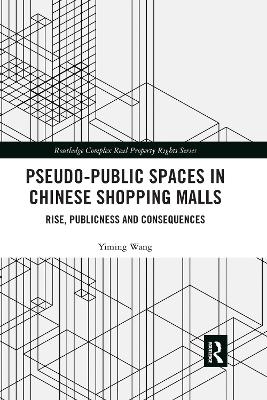
Pseudo-Public Spaces in Chinese Shopping Malls
Rise, Publicness and Consequences
Seiten
2021
Routledge (Verlag)
978-1-032-17799-1 (ISBN)
Routledge (Verlag)
978-1-032-17799-1 (ISBN)
This book develops a theoretical framework building on the work of Henri Lefebvre and David Harvey to provide insights that enrich theoretical and empirical debates and have the potential to inform urban policy in China.
Shopping malls in China create a new pseudo-public urban space which is under the control of private or quasi-public power structure. As they are open for public use, mediated by the co-mingling of private property rights and public meanings of urban space, the rise, publicness and consequences of the boom in the construction of shopping malls raises major questions in spatial political economy and magnifies existing theoretical debates between the natural and conventional schools of property rights.
In examining these issues this book develops a theoretical framework starting with a critique of the socio-spatial debate between two influential bodies of work represented by the work of Henri Lefebvre and David Harvey. Drawing on the framework, the book examines why pseudo-public spaces have been growing so rapidly in China since the 1980s; assesses to what degree pseudo-public spaces are public, and how they affect the publicness of Chinese cities; and explores the consequences of their rise.
Findings of this book provide insights that can help to better understand Chinese urbanism and also have the potential to inform urban policy in China. This book will be of interest to academics and researchers in both Chinese studies and urban studies.
Shopping malls in China create a new pseudo-public urban space which is under the control of private or quasi-public power structure. As they are open for public use, mediated by the co-mingling of private property rights and public meanings of urban space, the rise, publicness and consequences of the boom in the construction of shopping malls raises major questions in spatial political economy and magnifies existing theoretical debates between the natural and conventional schools of property rights.
In examining these issues this book develops a theoretical framework starting with a critique of the socio-spatial debate between two influential bodies of work represented by the work of Henri Lefebvre and David Harvey. Drawing on the framework, the book examines why pseudo-public spaces have been growing so rapidly in China since the 1980s; assesses to what degree pseudo-public spaces are public, and how they affect the publicness of Chinese cities; and explores the consequences of their rise.
Findings of this book provide insights that can help to better understand Chinese urbanism and also have the potential to inform urban policy in China. This book will be of interest to academics and researchers in both Chinese studies and urban studies.
Yiming Wang is a Postdoctoral Research Fellow at the College of Architecture and Urban Planning (CAUP) in Tongji University, China. He completed his PhD at the University of Technology Sydney, Australia. His research is centred on Chinese urbanism, spatial political economy and the publicness of space.
Contents
List of Figures
List of Tables
Series Editor Foreword
Preface
Abbreviations
1 Introduction
2 Understanding Spatial Transformation
3 The Rise of Pseudo-Public Spaces
4 The Publicness of Pseudo-Public Spaces
5 Consequences of Pseudo-Public Spaces
6 Conclusion
Bibliography
Appendices
Index
| Erscheinungsdatum | 01.10.2021 |
|---|---|
| Reihe/Serie | Routledge Complex Real Property Rights Series |
| Verlagsort | London |
| Sprache | englisch |
| Maße | 156 x 234 mm |
| Gewicht | 376 g |
| Themenwelt | Naturwissenschaften ► Geowissenschaften ► Geografie / Kartografie |
| Technik ► Architektur | |
| Wirtschaft ► Betriebswirtschaft / Management ► Rechnungswesen / Bilanzen | |
| Betriebswirtschaft / Management ► Spezielle Betriebswirtschaftslehre ► Immobilienwirtschaft | |
| ISBN-10 | 1-032-17799-3 / 1032177993 |
| ISBN-13 | 978-1-032-17799-1 / 9781032177991 |
| Zustand | Neuware |
| Informationen gemäß Produktsicherheitsverordnung (GPSR) | |
| Haben Sie eine Frage zum Produkt? |
Mehr entdecken
aus dem Bereich
aus dem Bereich
Handbuch für Studium und Praxis
Buch | Hardcover (2023)
Vahlen (Verlag)
CHF 109,95
Erfolgsstrategien für den modernen Immobilienmarkt
Buch | Softcover (2024)
ForwardVerlag
CHF 25,20
warum Rene Benkos Immobilienimperium zusammenbrach und was dem …
Buch | Hardcover (2024)
FinanzBuch Verlag
CHF 30,80


